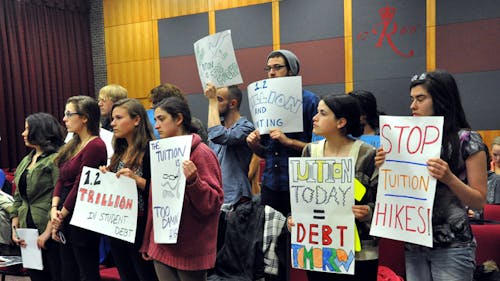Students speak out at Rutgers open budgeting hearing

The air was thick with tension at the open hearing on the University's budget last night at the College Avenue Student Center, where students, faculty and members of the Rutgers community made it clear how the University's financial decisions directly affect them.
Nancy Winterbauer, vice president of University Budgeting, opened the hearing with brief introductory comments, establishing context for the evening’s discussions by emphasizing the hearing as an opportunity for students and community to comment on tuition and fees.
“In that regard, it is important to remember that our primary funding sources for operating our schools and colleges are tuition fees and state support,” she said. “It is also important to note that our state-operated support is proposed to decrease for the coming year by $50 million dollars."
The 4 percent reduction continues a trend of declining state support and increasing reliance on tuition that began in the 1980s, Winterbauer said. In the 1990s, students paid about one-third of the cost of their education and the state paid two-thirds.
This year, that ratio has flipped, with the state only covering one-third of the cost of education. In the three years since University President Robert L. Barchi was appointed, tuition and fees at Rutgers have increased 2.5 percent, 3.3 percent and 2.3 percent, respectively.
Guided by Mark Angelson, chairman of the Institute of International Education’s Scholar Rescue Fund, multiple voices from all three Rutgers campuses were given two minutes to present their concerns about the University’s budget to the Board of Governors, though many went over the allotted time and expressed discontent with limiting the length of speakers’ comments.
Patrick Gibson, a School of Arts and Sciences sophomore, provided perspective as a student who is fortunate enough to graduate from Rutgers without debt.
“Many, if not most, of the students in this room aren’t in that situation. ... That is a failure to uphold the mission of the American university,” Gibson said. “There is this story we tell ourselves of (education) as a great equalizer ... but as long as the tuition at public institutions, and Rutgers in particular, remains as high as it is, that is an utter fabrication.”
A number of student speakers shared their personal struggles and social outrage with rising tuition rates at Rutgers and the insurmountable debt that many said they will spend “decades” paying off.
Sivan Rosenthal, a representative of Students for Shared Governance, asked the Board of Governors why Rutgers does not allocate more of its resources to lowering tuition costs.
“This is a public university: It’s supposed to serve the public, and it’s supposed to educate us," said the School of Arts and Sciences sophomore, who noted that she has seen friends drop out of Rutgers and join the military to afford their degrees. "But as students, we can only talk about our tuition once a year, and only if we register beforehand and only if we speak for less than two minutes."
The Union of Rutgers Administrators-American Federation of Teachers also made its presence known at the hearing, urging the BOG to freeze tuition and not faculty salaries.
Representatives highlighted several instances of what they feel are examples of unnecessary spending, citing the $1.2 million in severance pay to former basketball coach Mike Rice and former Athletic Director Tim Pernetti following the Mike Rice abuse scandal.
According to URA-AFT, Rutgers staff have seen salary freezes, increased health insurance and pension costs since 2008.
Lucye Millerand, president of URA-AFT, said that at the bargaining table, URA-AFT is repeatedly told that Rutgers cannot pay their salary package.
“We stay and work hard, but the Rutgers budget puts a higher priority on golden parachutes for coaches and executives who embarrass the University,” she said. “We’ve run the numbers, and we’re very sure that Rutgers has in reserves enough to raise salaries and freeze tuition.”
The Board of Governors student representatives were given a chance to speak following the conclusion of the hearing’s public input, sympathizing with their fellow students and thanking attendees for their participation.
Anthony Covington, student chair trustee to the BOG, said while he faces many of the same obstacles many student speakers detailed, it is important to consider the outside factors influencing how the University allocates its funds.
“I have personal relationships with many of the people (on the BOG), and I can tell you they aren’t mean people. They aren’t out to get you,” the School of Arts and Sciences senior said. “I understand you are all passionate ... but sometimes there are things that are out of our control.”



